Portugal Calendar 2025 - Public & Regional Holidays, Significance and Activities
19:35 | 09/11/2024 Print
Portugal, a country with a rich cultural heritage and deep Catholic traditions, celebrates numerous public and regional holidays throughout the year. From the grand festivities of St. John’s Day in Porto to the serene religious processions of Faro, these celebrations reflect the strong connection between communities and their heritage. Whether honoring local saints or celebrating regional autonomy, these holidays are vital to Portugal’s cultural identity.
In 2025, Portugal offers a mix of solemn observances and joyful festivities that showcase its national and regional pride.
Learn more: Europe Calendar 2025 - List of Public Holidays and Celebration
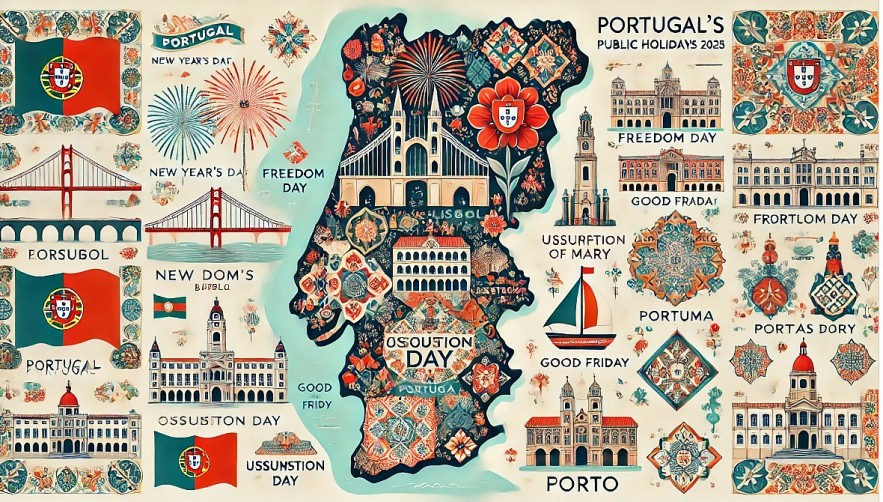 |
| A stylized map of Portugal illustrating its key public holidays with cultural and historical symbols, such as fireworks for New Year’s Day in Lisbon, a red carnation for Freedom Day, and a Christmas tree for Porto |
List of Public Holidays in Portugal 2025: Significance and Celebrations
Portugal officially recognizes 13 national public holidays. These are celebrated nationwide, with closures of schools, government offices, and most businesses. Additionally, some regions and municipalities observe their own holidays.
1. New Year’s Day (Ano Novo)
- Date: January 1, 2025
- Type: National Public Holiday
- Closures: Schools, public offices, and most businesses are closed.
- History and Significance:
New Year’s Day marks the beginning of the calendar year and is a time for renewal and hope.
- Celebrations and Activities:
Families gather for festive meals, and many attend midnight celebrations with fireworks in cities like Lisbon and Porto. A traditional New Year’s meal often includes bacalhau (salt cod) and bolo-rei (king cake).
2. Good Friday (Sexta-Feira Santa)
- Date: April 18, 2025
- Type: National Public Holiday
- Closures: Schools, public offices, and most businesses are closed.
- History and Significance:
Good Friday commemorates the crucifixion of Jesus Christ. It is a solemn and important day in Portugal’s Catholic tradition.
- Celebrations and Activities:
Religious processions are held throughout the country, particularly in Braga and Óbidos, where the streets are transformed into stages for reenactments of the Passion of Christ.
3. Easter Sunday (Páscoa)
- Date: April 20, 2025
- Type: Observed Nationwide (Not a statutory public holiday but widely celebrated)
- History and Significance:
Easter celebrates the resurrection of Jesus Christ. It is one of the most important religious holidays in Portugal.
- Celebrations and Activities:
Families gather for festive meals featuring roast lamb or goat and folar, a traditional Easter bread with eggs. Church services and local processions are also part of the observances.
4. Freedom Day (Dia da Liberdade)
- Date: April 25, 2025
- Type: National Public Holiday
- Closures: Schools, public offices, and most businesses are closed.
- History and Significance:
Freedom Day commemorates the peaceful Carnation Revolution of 1974, which ended Portugal’s dictatorship and restored democracy.
- Celebrations and Activities:
Parades and concerts are held in major cities, including Lisbon. Red carnations, symbolizing the revolution, are displayed prominently.
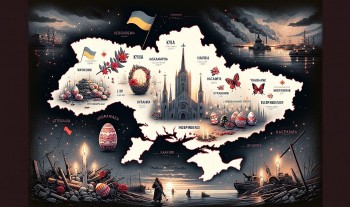 2025 Ukraine Calendar - List of Public Holidays, Observances, Celebrations and Activities 2025 Ukraine Calendar - List of Public Holidays, Observances, Celebrations and Activities |
5. Labour Day (Dia do Trabalhador)
- Date: May 1, 2025
- Type: National Public Holiday
- Closures: Schools, public offices, and most businesses are closed.
- History and Significance:
Labour Day celebrates workers’ rights and achievements.
- Celebrations and Activities:
Trade unions organize rallies and marches in cities like Lisbon and Coimbra. Many families also use the day for picnics or countryside outings.
6. Portugal Day (Dia de Portugal, de Camões e das Comunidades Portuguesas)
- Date: June 10, 2025
- Type: National Public Holiday
- Closures: Schools, public offices, and most businesses are closed.
- History and Significance:
Portugal Day honors Luís de Camões, Portugal’s greatest poet, and celebrates the Portuguese-speaking community worldwide.
- Celebrations and Activities:
Official ceremonies, including speeches by government officials, take place in Lisbon or another host city. The day also features parades, cultural events, and concerts.
7. Corpus Christi (Corpo de Deus)
- Date: June 19, 2025
- Type: National Public Holiday
- Closures: Schools, public offices, and most businesses are closed.
- History and Significance:
Corpus Christi celebrates the Eucharist in Catholic tradition.
- Celebrations and Activities:
Religious processions, often involving decorated streets, are held in towns like Tomar and Braga. Community feasts are common.
8. Assumption of Mary (Assunção de Nossa Senhora)
- Date: August 15, 2025
- Type: National Public Holiday
- Closures: Schools, public offices, and most businesses are closed.
- History and Significance:
This Catholic holiday commemorates the Virgin Mary’s assumption into heaven.
- Celebrations and Activities:
Pilgrimages to Marian shrines, such as Fátima, are common. Many towns also hold local fairs and processions.
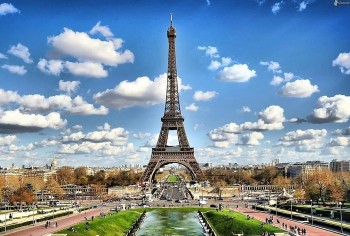 France Calendar in 2025 - Full List of Public Holidays And Observances: Dates and Celebrations France Calendar in 2025 - Full List of Public Holidays And Observances: Dates and Celebrations |
9. Republic Day (Implantação da República)
- Date: October 5, 2025
- Type: National Public Holiday
- Closures: Schools, public offices, and most businesses are closed.
- History and Significance:
Republic Day marks the establishment of the Portuguese Republic in 1910, ending the monarchy.
- Celebrations and Activities:
Official ceremonies, flag-raising events, and historical reenactments take place, especially in Lisbon.
10. All Saints’ Day (Dia de Todos os Santos)
- Date: November 1, 2025
- Type: National Public Holiday
- Closures: Schools, public offices, and most businesses are closed.
- History and Significance:
All Saints’ Day honors all saints and deceased loved ones.
- Celebrations and Activities:
Families visit cemeteries to clean and decorate graves with flowers. Traditional sweets like broas (small biscuits) are shared.
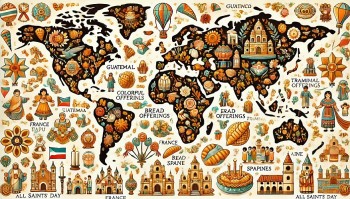 All Saints' Day - Origin, Meaning, Traditions, and Celebrations Around the World All Saints' Day - Origin, Meaning, Traditions, and Celebrations Around the World |
11. Restoration of Independence Day (Restauração da Independência)
- Date: December 1, 2025
- Type: National Public Holiday
- Closures: Schools, public offices, and most businesses are closed.
- History and Significance:
This holiday celebrates Portugal’s restoration of independence from Spain in 1640.
- Celebrations and Activities:
Parades and cultural events highlight Portugal’s national pride and history.
12. Immaculate Conception (Imaculada Conceição)
- Date: December 8, 2025
- Type: National Public Holiday
- Closures: Schools, public offices, and most businesses are closed.
- History and Significance:
This Catholic holiday celebrates the Virgin Mary’s immaculate conception.
- Celebrations and Activities:
Religious services and family gatherings are common.
13. Christmas Day (Natal)
- Date: December 25, 2025
- Type: National Public Holiday
- Closures: Schools, public offices, and most businesses are closed.
- History and Significance:
Christmas celebrates the birth of Jesus Christ.
- Celebrations and Activities:
Families gather for festive meals, exchanging gifts and enjoying traditional treats like bolo-rei and roasted lamb. Midnight Mass, or Missa do Galo, is a beloved tradition.
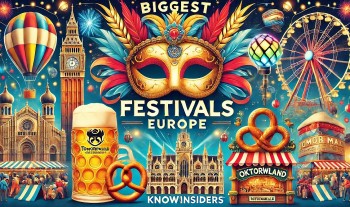 Top 15 Biggest Festivals and Carnivals in Europe in 2025 Top 15 Biggest Festivals and Carnivals in Europe in 2025 |
List of Regional Holidays in Portugal 2025
In addition to the national public holidays, Portugal’s 18 districts and two autonomous regions (Azores and Madeira) celebrate a variety of regional holidays. These days often honor local patron saints, significant historical events, or regional cultural traditions. While these are not nationwide holidays, they hold great significance within their respective communities.
Here’s an overview of regional holidays in Portugal for 2025:
1. Madeira Day (Dia da Madeira)
- Date: July 1, 2025
- Region: Madeira
- Significance:
Celebrates Madeira's autonomy, granted in 1976.
- Celebrations:
Cultural events, folk music, and traditional dances are held across the island.
2. Azores Day (Dia da Região Autónoma dos Açores)
- Date: May 27, 2025 (Celebrated on the Monday after Pentecost)
- Region: Azores
- Significance:
Marks the Azores’ autonomy and celebrates regional culture and history.
- Celebrations:
Parades, concerts, and community feasts.
3. St. Anthony’s Day (Dia de Santo António)
- Date: June 13, 2025
- Region: Lisbon
- Significance:
Honors St. Anthony, Lisbon’s patron saint.
- Celebrations:
The city hosts vibrant festivals, including Marchas Populares, street parades, and sardine barbecues.
4. St. John’s Day (Dia de São João)
- Date: June 24, 2025
- Region: Porto and Braga
- Significance:
Celebrates St. John, the patron saint of Porto and Braga.
- Celebrations:
- Porto hosts São João Festival, featuring fireworks, music, and street parties.
- Traditional rituals include hitting friends with plastic hammers or leeks for good luck.
5. St. Peter’s Day (Dia de São Pedro)
- Date: June 29, 2025
- Regions: Various towns, including Póvoa de Varzim and Montijo
- Significance:
Celebrates St. Peter, the patron saint of fishermen.
- Celebrations:
Coastal towns hold boat parades, fireworks, and seafood feasts.
6. Faro Day (Dia do Município de Faro)
- Date: September 7, 2025
- Region: Faro
- Significance:
Commemorates the city’s patron saint, Our Lady of Light.
- Celebrations:
Religious processions and cultural events take place across Faro.
7. Coimbra Day (Dia do Município de Coimbra)
- Date: July 4, 2025
- Region: Coimbra
- Significance:
Dedicated to Queen Elizabeth of Portugal (Rainha Santa Isabel), the city’s patron saint.
- Celebrations:
Religious processions and traditional fairs.
8. Évora Day (Dia do Município de Évora)
- Date: September 29, 2025
- Region: Évora
- Significance:
Honors St. Michael, the city’s patron saint.
- Celebrations:
Church services and local fairs are held.
9. Alcobaça Day (Dia do Município de Alcobaça)
- Date: August 20, 2025
- Region: Alcobaça
- Significance:
Marks the Feast of St. Bernard, the patron saint of the city.
- Celebrations:
Religious ceremonies, cultural events, and processions.
10. Guimarães Day (Dia de Guimarães)
- Date: November 24, 2025
- Region: Guimarães
- Significance:
Celebrates the city’s history as the birthplace of Portugal.
- Celebrations:
Historical reenactments, cultural exhibitions, and community gatherings.
11. Funchal Day (Dia do Município de Funchal)
- Date: August 21, 2025
- Region: Funchal (Madeira)
- Significance:
Celebrates Funchal’s founding.
- Celebrations:
Fireworks, concerts, and traditional Madeira folk performances.
12. Regional Holidays in the Azores
In addition to Azores Day, each island in the Azores archipelago celebrates its own municipal holiday. For example:
- Festival of the Holy Spirit (Festas do Espírito Santo): Various islands hold these festivities between May and July.
- Angra do Heroísmo Day: Observed in Terceira with parades and cultural events.
13. Regional Pilgrimage Festivals
Many regions hold pilgrimage festivals (romarias) tied to local saints, such as:
- Our Lady of Nazaré Festival in Nazaré.
- Feast of Our Lady of Agony (Festa da Senhora d’Agonia) in Viana do Castelo (August 2025).
Conclusion
Portugal’s public holidays in 2025 reflect its rich cultural and religious traditions, as well as its historical milestones. From solemn religious observances to joyful national celebrations, these holidays offer a unique window into Portuguese life. Visitors to Portugal will find each holiday an opportunity to experience the country’s deep-rooted heritage, vibrant festivals, and warm hospitality.
FAQs
-
What are Portugal’s most important holidays?
Easter, Freedom Day (April 25), and Christmas are among the most significant holidays in Portugal.
-
Are shops and offices open on public holidays in Portugal?
Most shops, schools, and offices are closed, but restaurants and tourist services may remain open.
-
What is unique about Freedom Day in Portugal?
Freedom Day celebrates the peaceful Carnation Revolution of 1974, which ended decades of dictatorship and restored democracy.
-
Do regions in Portugal have additional holidays?
Yes, cities like Lisbon and Porto celebrate their patron saints with additional holidays and festivals.
-
How do Portuguese families celebrate Christmas?
Christmas is celebrated with Midnight Mass, family feasts featuring traditional dishes like bacalhau, and the exchange of gifts.
Ngosugar
Article URL: https://knowinsiders.com/portugal-calendar-2025-public-regional-holidays-significance-and-activities-41135.html
All rights reserved by KnowInsider
